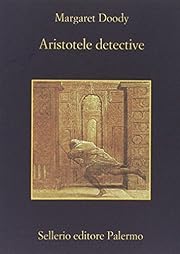

Click on a thumbnail to go to Google Books.
|
Loading... Aristotle Detective (1978)by Margaret Doody

Overdue Podcast (642) No current Talk conversations about this book.   ) )Picture this. The year is 332 B.C. and Athens is under the thumb of Alexander the Great. Closer to home, an Athenian citizen is found with an arrow clean through his jugular. A clear case of murder for no one stabs themselves to death with an arrow, so deduces the citizen public. What is not so clear is how Philemon, a young man already in exile for an accidental death in a barroom brawl, is fingered for the crime. Just how can an absent man commit such a heinous act? The task to prove his innocence falls to Philemon's cousin, Stephanos. Under Athenian law, inexperienced and naive Stephanos must defend the family name in Philemon's absence. Here's where Aristotle comes in. Once Stephanos's mentor, Stephanos knows he can trust Aristotle to guide him to the truth. Like all gripping suspense stories, all evidence points to Philemon's guilt and clearing his name becomes a Herculean task. It's the proverbial David and Goliath story with Stephanos the clear underdog. 332 B.C. The young Athenian, Stephanos, is trying to clear his cousin, Philemon, of a murder accusation. Apparently, Philemon has been exiled for manslaughter and so Stephanos feels he wasn't even in Athens at the time of the murder. He consults Aristotle, who philosophically and logically tries to figure out the solution. For the most part, Stephanos does the running around and interviewing while the philosopher offers advice and deductions. An heirloom, a red clay pot from the victim's house and a piece of horn from a Cretan bow found outside the house, are the first clues. After red herrings, attempted murder of Stephanos, and a trip by Aristotle to Corinth, an ingenious solution to the mystery is found and brought out in a courtroom drama. Ms. Doody wrote this novel in 1978, long before the current trend of mysteries set in ancient Greece. I felt this is one of the better in the genre; Ms. Doody also set me down right in the middle of Greek culture of those times. Workings of the Greek legal system and of Aristotle's lessons in rhetoric [we'd say public speaking] were fascinating. Highly recommended. no reviews | add a review
Murder and mayhem may seem like unreasonable company for Aristotle, one of the founding minds of Western philosophy. But in the skilled hands of Margaret Doody, the pairing could not be more logical. With her Aristotle Detective novels, Margaret Doody brings a Holmesian hero to the bloodied streets of ancient Greece, trading the pipe and deerstalker of Sherlock for the woolen chiton and sandals of Aristotle. Replete with suspense, historical detail, and humor, and complemented by an ever-growing cast of characters and vivid descriptions of the ancient world, Doody ?s mysteries are as much lively takes on the figures and forms of the classics as they are classic whodunits in their own right. In Aristotle Detective, we first meet Stephanos ?naive Watson to Aristotle ?s learned Holmes ?a young landed Athenian and student of Aristotle. With the aid of his cunning, olive-loving teacher, Stephanos must clear his exiled cousin of murder and save his family ?s honor in a tense public trial. Will Stephanos survive to cinch the case? No library descriptions found. |
Current DiscussionsNonePopular covers
 Google Books — Loading... Google Books — Loading...GenresMelvil Decimal System (DDC)823.914Literature English & Old English literatures English fiction 1900- 1901-1999 1945-1999LC ClassificationRatingAverage: (3.23) (3.23)
Is this you?Become a LibraryThing Author. |
||||||||||||||||||||||||||||||||||||||||||||||||||||||||||||||||||||||||||||||||||||||||||||||||||||||||||||||||||||||||